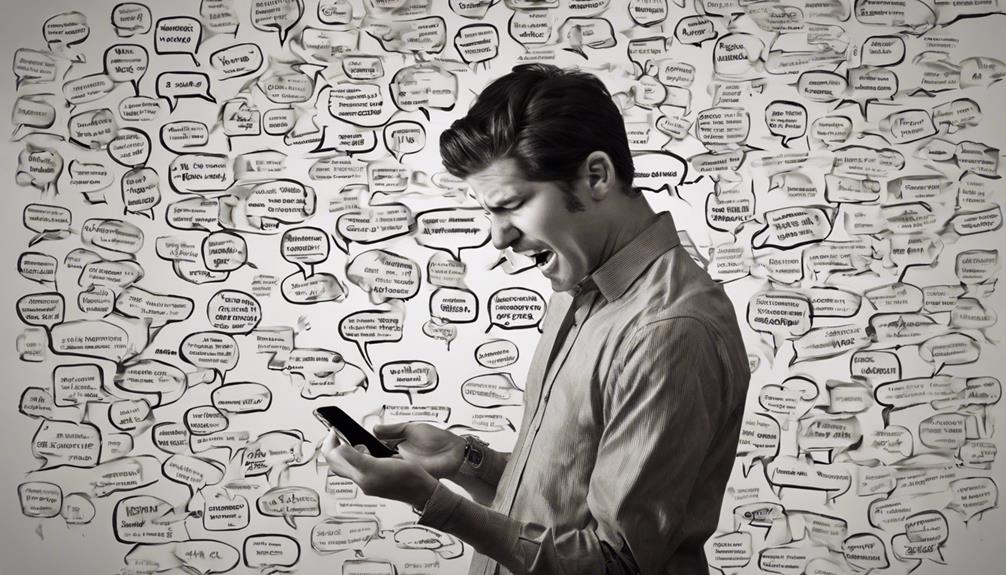In the domain of communication, the discovery that messages elicit more honest replies is fascinating. What might be the reasons behind this captivating occurrence?
Let's explore the implications of this study on our interactions and the authenticity of our responses in the digital era.
Key Takeaways
- Text messages prompt more sincere responses to 'How are you' inquiries.
- Responses via text are typically more accurate than face-to-face interactions.
- Tailoring responses based on the relationship and mood is essential.
- Sharing honestly about good or bad days can strengthen relationships.
Research on Text Vs. Face-To-Face Responses
When comparing responses to 'How are you' inquiries, text messages have been shown to elicit more honest and accurate answers than face-to-face conversations, according to research findings.
Communication dynamics play a crucial role in shaping individuals' responses, with text messages offering a sense of comfort and distance that encourages openness. The psychological effects of this medium create a safe space for individuals to express their true feelings without the pressure of immediate reactions or judgments.
In contrast, face-to-face interactions can sometimes lead to social desirability bias, where individuals may provide answers based on societal norms rather than their genuine emotions. Understanding these nuances in communication dynamics sheds light on why people tend to be more candid and sincere when responding to 'How are you' texts.
Impact of Text Messages on Honesty

Text messages have been found to significantly impact the honesty of responses compared to face-to-face interactions, highlighting the unique influence of this medium on communication dynamics. The asynchronous nature of texting allows individuals more time to reflect on their responses, fostering trust-building dynamics and encouraging emotional authenticity.
This increased level of introspection often leads to more genuine and sincere answers, as individuals feel less pressured to conform to societal norms or expectations. By providing a platform that supports contemplation and reflection, text messages pave the way for more open and transparent communication.
This shift towards honesty in responses can strengthen relationships and deepen connections, ultimately enhancing the quality of interactions.
Varied Responses to 'How Are You
Moving from the impact of text messages on honesty, the varied responses to the question 'How are you' reflect the diverse ways individuals engage in meaningful communication through texts. When exploring responses to this common inquiry, we find that:
- Classic responses like 'Fine, thank you' and 'I'm great' are suitable.
- Tailoring responses based on the relationship with the other person and mood is essential.
- Responses like 'Awesome' or 'Great' can convey enthusiasm effectively.
- Humorous responses such as 'I still haven't figured it out' add a light-hearted touch.
- Flirty banter like 'I thought today was going to be bad, but it looks like it's getting better' can bring a playful element to the conversation.
Sharing Positive News and Accomplishments

How can positive news and accomplishments be effectively shared through responses to 'How Are You' texts? When sharing positive news and celebrating achievements, it's essential to spread positivity and show genuine happiness for others. One effective way to do this is by acknowledging team members' accomplishments, which can generate goodwill and strengthen relationships. Additionally, sharing positive updates about mutual friends or colleagues can create an uplifting atmosphere in the conversation. Using responses like 'Well' or 'Very Well' with adverbs can help maintain a positive tone and convey enthusiasm effectively. By sharing and celebrating achievements through 'How Are You' texts, we can foster a culture of positivity and support among friends and colleagues.
| Strategies to Share Positive News and Accomplishments |
|---|
| Acknowledge team members' accomplishments |
| Share positive updates about mutual friends or colleagues |
| Use responses like 'Well' or 'Very Well' with adverbs |
| Celebrate achievements to spread positivity |
| Foster a culture of support and happiness |
Honesty About Bad Days
During challenging times, it's crucial to be candid about our not-so-good days to nurture authentic connections with others. It's important to navigate relationships with honesty, even when discussing difficult moments. Vulnerability benefits relationships by fostering deeper connections and understanding.
Here are some ways to approach honesty about bad days:
- Acknowledge your feelings without downplaying them.
- Share specific struggles to allow others to empathize.
- Express gratitude for support during tough times.
- Offer a listening ear in return when others need to share.
- Remember that honesty builds trust and strengthens bonds.
Handling Negative and Humorous Responses

Negative and humorous responses to 'How Are You' texts require tactful handling to maintain positive communication exchanges. Navigating negativity involves acknowledging the feelings while reframing the response in a more positive light.
Responses like 'Could be better' can be redirected with a touch of humor, such as 'Could be better, could be worse, at least I'm still breathing!' Humor in responses can lighten the mood and shift focus from the negative to a more lighthearted interaction.
Responses like 'I'm surviving on coffee and dry shampoo' inject humor into the conversation while acknowledging a less-than-ideal situation. Balancing negativity with humor can prevent misunderstandings and keep the conversation engaging and enjoyable.
Frequently Asked Questions
How Do Cultural Differences Influence the Honesty of Responses to 'How Are You' Texts?
When considering the influence of cultural differences on responses to 'how are you' texts, a cross-cultural analysis reveals varying effects. Social norms play a significant role in shaping the honesty of these responses.
Different cultural expectations and communication styles impact the authenticity of replies. Understanding these nuances can enhance our interactions and foster deeper connections across diverse cultural backgrounds.
Embracing cultural diversity enriches our understanding of how individuals express themselves through texts.
Are There Any Gender Differences in the Types of Responses People Give to 'How Are You' Texts?
When it comes to 'How are you' texts, gender differences play a role in the emotional responses given. Men often opt for brief and factual replies, like 'Good' or 'Not bad,' while women tend to share more detailed feelings and experiences, such as 'Feeling a bit stressed but hanging in there.'
These distinctions reflect societal norms surrounding emotional expression and communication styles. Understanding these differences enhances our interactions and fosters deeper connections.
Can the Frequency of 'How Are You' Texts Impact the Level of Honesty in Responses?
When considering the impact of the frequency of 'how are you' texts on honesty in responses, we see that it can indeed influence the depth of sharing. The more often these texts occur, the more comfortable individuals may become in expressing genuine feelings.
Cultural influences also play a role in shaping these interactions, affecting the level of openness and honesty conveyed. This dynamic suggests that regular 'how are you' exchanges can foster deeper connections and authenticity.
How Do Age Demographics Affect the Choice of Responses to 'How Are You' Texts?
When considering response patterns to 'How are you' texts, age influence is a key factor. Younger individuals often opt for concise and casual replies, like 'Good' or 'Not bad,' reflecting their fast-paced communication style.
In contrast, older demographics tend to offer more detailed and reflective responses, such as 'I'm doing well, thank you for asking.' Understanding these age-related nuances can enhance the quality of interactions and bridge generational communication gaps effectively.
What Role Does the Timing of the Text Message Play in the Sincerity of Responses to 'How Are You'?
When considering the timing of a text message in eliciting honest responses to 'how are you,' emotions play a crucial role. Timely messages can evoke more genuine emotions, fostering a deeper connection and trustworthiness in the exchange.
Understanding how timing influences emotional receptivity is key to generating sincere responses. Establishing a sense of emotional connection through well-timed messages can enhance the quality and authenticity of responses to inquiries about well-being.
Do Texts Really Elicit More Honest Responses, Especially When Comforting Someone?
When it comes to comforting someone through text, knowing how to comfort through text can make a real difference in the honesty of their responses. Texts can provide a sense of anonymity and distance, allowing people to open up more freely about their feelings and experiences.
Conclusion
In conclusion, the study highlights the intriguing contrast in honesty between text messages and face-to-face interactions. Texts appear to stimulate more genuine responses, allowing individuals to express themselves authentically.
It's fascinating to witness the power of written communication in eliciting sincere emotions and thoughts. As the saying goes, 'actions speak louder than words,' and in this case, texts reveal the true essence of human expression.









